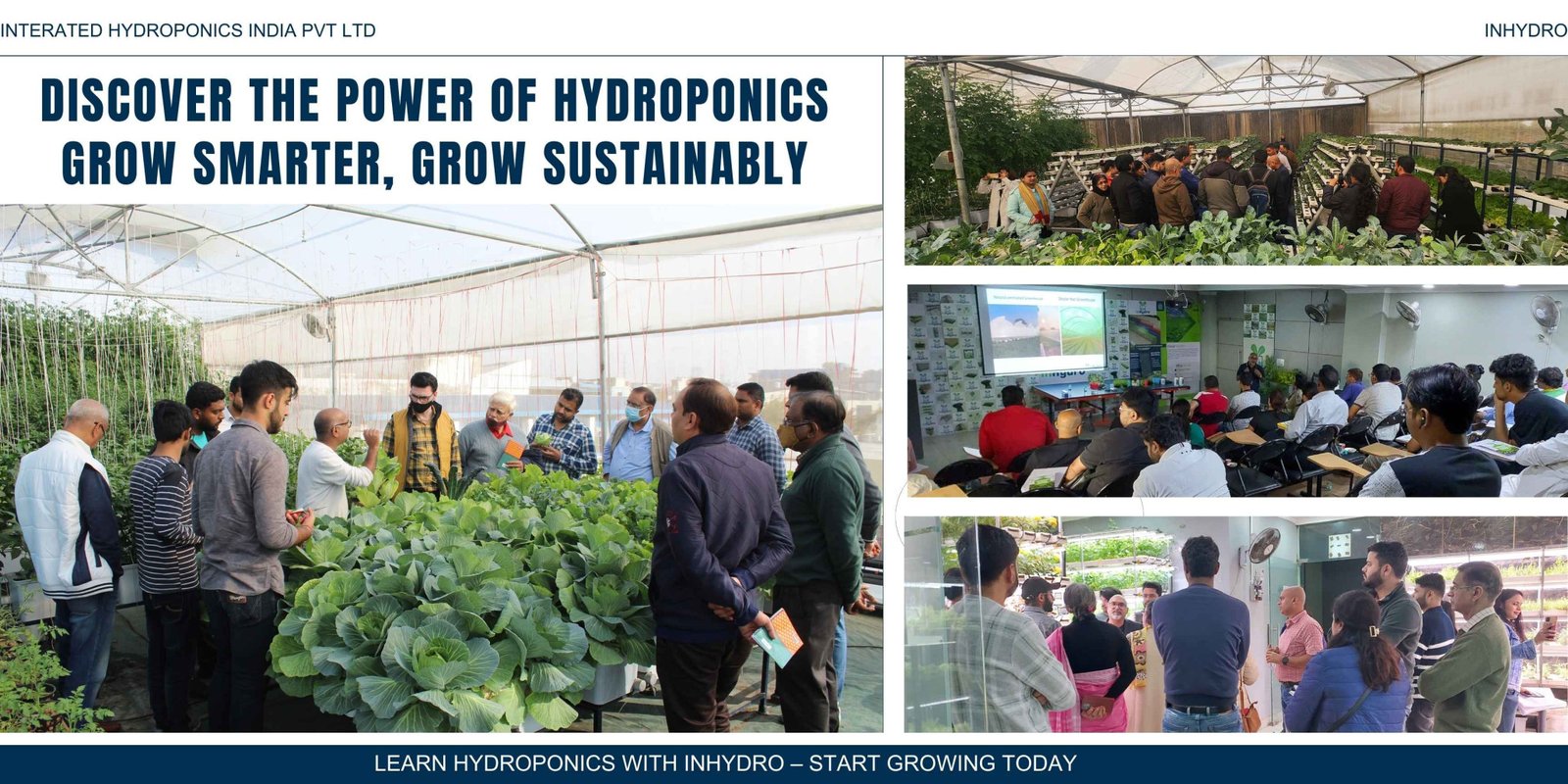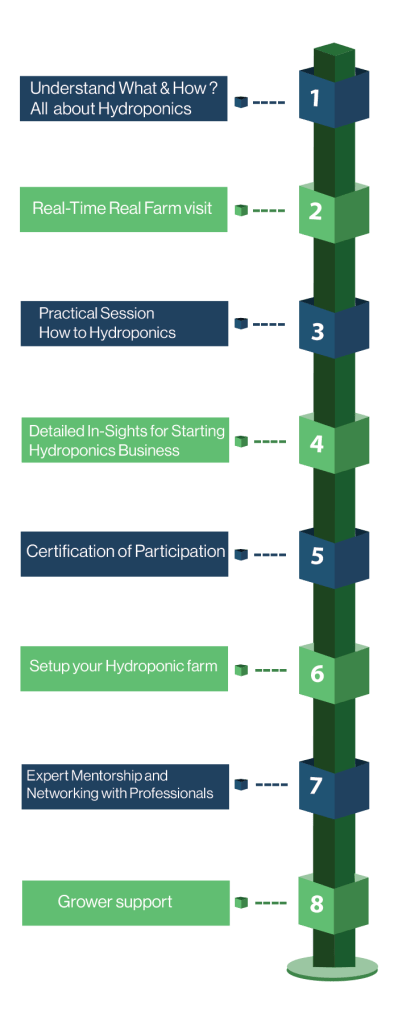
Are you a working professional with a passion for agribusiness? Ready to turn that passion into a profitable venture without compromising your current career? Join our immersive Three-Month Weekend Course on Commercial Hydroponics Business, designed specifically for busy professionals, aspiring agripreneurs, and hydroponics enthusiasts. This hands-on course offers comprehensive insights into the commercial hydroponics industry, equipping you with the latest techniques, technologies, and best practices to establish and manage a successful hydroponic farming business. Whether you’re starting from scratch or looking to scale your existing operations, this weekend course is your pathway to a sustainable and profitable future in modern agriculture.
This extensive course is tailored for professionals eager to advance their skills in the hydroponics business, all while balancing their current work commitments. Participants will explore the core principles of commercial hydroponics, delve into essential business components, and gain practical techniques for setting up and managing a thriving hydroponic enterprise. You will leave with the knowledge, confidence, and practical experience needed to excel in this innovative industry.
- Understand the Fundamentals: Learn the basics of hydroponic systems and their commercial applications.
- Develop a Viable Business Plan: Create a detailed business plan tailored to hydroponic farming.
- Design and Set Up: Master the design and setup of a commercial hydroponic farm.
- Manage Crops Effectively: Gain expertise in crop management, including nutrient and pest management.
- Craft Marketing Strategies: Develop effective marketing and sales strategies for hydroponic produce.
- Build Industry Connections: Expand your network with industry professionals and potential partners.
Our Three-Month Weekend Course on Commercial Hydroponics Business is an intensive program that balances theoretical learning with practical, hands-on experience. Held over weekends, the course allows you to continue working while gaining a comprehensive understanding of hydroponic systems and controlled environment agriculture, tailored specifically for commercial applications. By the end of the course, you will have the expertise and practical skills to establish and manage successful hydroponic operations, paving the way for a profitable and sustainable agribusiness.
Real-Time Real Farm visit
Practical
Session
Certification of Participation
Detailed In-Sights for Starting Hydroponics Business
Vendor Details for procurement of Hydroponic related products
Expert Mentorship and Networking with Professionals
CONSULTING ENGAGEMENTS ON HYDROPONICS FARMING
CROPS INCLUDES LEAFY GREENS, HERBS, VINE CROPS AND FRUITS
PROFESSIONAL AGRONOMISTS TO SUPPORT OUR GROWERS
LEARNING COMMUNITY MEMBERS ON HYDROPONICS FARMING

This course is ideal for:
- Working Professionals: Individuals looking to transition into agribusiness while maintaining their current careers.
- Aspiring Agripreneurs: Individuals looking to start a commercial hydroponics business.
- Established Farmers: Farmers interested in integrating hydroponics into their existing operations.
- Agribusiness Professionals: Those seeking to expand their knowledge in modern farming techniques.
- Horticulture Enthusiasts: Individuals passionate about commercial-scale horticulture.
- Investors: Those exploring investment opportunities in hydroponics.

Introduction to Hydroponics Technology
- Understanding Soil-less Cultivation: Explore the benefits and advantages of hydroponics in modern agriculture.
- Overview of Basic Hydroponic Systems: Introduction to foundational systems such as Deep Water Culture (DWC), Nutrient Film Technique (NFT), and vertical farming setups.
- Commercial Viability of Hydroponic Agribusiness: Analyze the commercial potential and profitability of hydroponic farming.
- Advanced Hydroponic Systems for Commercial Operations: Dive into systems tailored for large-scale hydroponic businesses.
- Market Trends and Profitable Crops: Identify high-yield, in-demand crops and emerging market opportunities.

Greenhouse Cultivation for Hydroponics
- Benefits of Greenhouse Cultivation: Learn how controlled environments enhance hydroponic production.
- Types of Greenhouses and Structures: Explore the different greenhouse designs, including climate-controlled and naturally ventilated options.
- Environmental Control for Optimal Growth: Planning for light, temperature, humidity, and ventilation to support plant health.
- Climate Control Systems: Implementation and management of climate control systems for precise environmental regulation.

Setting Up Your Hydroponic System
- Exploring Hydroponic Systems: Detailed exploration of various systems like DWC, NFT, and vertical farming setups.
- Space Optimization for Productivity: Strategies for designing an efficient layout to maximize space and yield.
- Establishing Your Hydroponic Facility: Guidelines for selecting appropriate systems, growing mediums, and essential equipment.
- Designing and Building Hydroponic Systems: Practical training in constructing and customizing hydroponic setups for commercial use.

Hydroponic Nutrient Management
- Nutrients in Hydroponic Plant Growth: Understand the critical role of nutrients and how they impact plant health.
- Water Quality Management: Learn the importance of water quality and its effects on plant growth.
- pH and EC/TDS Monitoring: Master the basics of pH, EC/TDS, and how to monitor and adjust them for optimal plant health.
- Nutrient Solution Formulation: Techniques for creating and adjusting nutrient solutions tailored to specific crops.
- Standard Nutrient Ranges in Hydroponics: Reference guidelines for maintaining appropriate nutrient levels.

Financial Planning, Subsidies, and Government Support
- Introduction to Government Initiatives: Explore various central and state government schemes supporting hydroponic farming and horticulture development, including protected cultivation under hydroponics.
- Sub-Mission on Agricultural Mechanization (SMAM): Financial assistance for adopting advanced machinery and technology in hydroponic setups.
- Applying for Subsidies and Grants: Step-by-step guide to applying for government subsidies and grants, including required documentation and eligibility.
- Understanding Subsidy Disbursement Processes: Learn how and when subsidies are disbursed and how to track your application.
- Tax Benefits and Incentives for Agribusinesses: Identifying tax exemptions and incentives for hydroponic businesses under Indian tax laws.
- Agriculture Infrastructure Fund (AIF): Leveraging low-interest loans for setting up or expanding hydroponic facilities.
- NABARD Assistance: Understanding the role of NABARD in providing financial support for agribusinesses, including hydroponics.
- Startup India Initiative: Exploring funding opportunities for agritech startups under the Startup India scheme.

Hydroponic Crop Management
- Selecting Suitable Crops: Identify and select crops that are most suitable for hydroponic cultivation.
- Planting and Maintenance: Techniques for planting, transplanting, and caring for hydroponic crops.
- Nutrient Strategies for High Yields: Advanced strategies for nutrient management to maximize production.
- Advanced Cultivation Techniques: Best practices for achieving high yields and consistent production.
- Pest and Disease Management: Identify and manage common pests and diseases with integrated pest management (IPM) strategies.

Automation in Hydroponics Farms
- Emerging Trends in Automation: Overview of the latest trends and technologies in hydroponics automation.
- Automated Nutrient and Irrigation Systems: Introduction and hands-on setup of automated nutrient dosing, mixing, and irrigation systems.
- Environmental Control Automation: Automating the control of temperature, humidity, CO2 levels, and airflow for optimized plant growth.
- Smart Technology for Remote Monitoring: Utilize smart technologies for monitoring and controlling your hydroponic systems remotely.

Post-Harvest Management in Hydroponics
- Introduction to Post-Harvest Management: Overview of the critical role of post-harvest processes in maintaining product quality and extending shelf life.
- Stages of Post-Harvest Handling: Understanding the sequence from harvest to storage, packaging, and distribution.
- Handling Procedures: Best practices for handling produce immediately after harvest to prevent bruising and spoilage.
- Cooling and Storage Techniques: Implementing cooling methods such as refrigeration or cold rooms to extend the shelf life of hydroponic produce.
- Humidity and Temperature Control: Managing environmental conditions in storage facilities to preserve the quality and freshness of produce.
- Labeling and Branding: Developing attractive and informative packaging labels that comply with regulations and appeal to consumers.
- Opportunities for Value Addition: Exploring ways to add value to hydroponic produce through processing, such as creating packaged salads or ready-to-eat products.
- Small-Scale Processing Units: Setting up small-scale processing units to diversify product offerings.
- Exploring New Markets: Identifying markets for value-added products and developing strategies to tap into these opportunities.

Guided Tour and Practical Workshops
- Guided Tour of Hydroponic Facilities: Experience a tour of state-of-the-art commercial hydroponic greenhouses.
- Interactive Workshops: Participate in workshops that cover planting, nutrient management, and system maintenance.
- Q&A with Industry Experts: Engage in sessions with experienced professionals to gain deeper insights into the commercial hydroponics industry.
- Understanding the Environmental Impact: Learn about the sustainability benefits of hydroponics in reducing water usage, maximizing space, and minimizing environmental impact.

Financial Management and Budgeting
- Initial Setup Costs: Breakdown of costs involved in starting a hydroponic farm, including infrastructure, equipment, and operational expenses.
- Capital Expenditures (CapEx): Understanding the long-term investments required, such as greenhouses, automation systems, and land.
- Operational Expenditures (OpEx): Analysis of ongoing costs including utilities, labor, maintenance, and supplies.
- Revenue Streams: Identifying potential income sources, such as direct sales, B2B contracts, and value-added products.
- Financial Forecasting: Techniques for projecting revenue and profit over time, considering factors like crop yield, market prices, and seasonal variations.
- Break-Even Analysis: Determining the point at which your hydroponic business will start making a profit.
Mode/Duration
3 Months: weekend
Classroom/Farm
Fee ₹35000/-
Learning Based outcomes
Join INHYDRO’s 3-Month Weekend Course on Commercial Hydroponics Farming and gain comprehensive, hands-on knowledge of the hydroponics industry. This weekend-only program is perfect for busy professionals, entrepreneurs, or growers looking to deepen their understanding of commercial-scale hydroponic farming. Over the course of three months, you’ll master advanced techniques in hydroponic systems, nutrient management, pest control, and sustainable farming practices.
Trainer
Led by industry veterans with extensive experience in commercial hydroponics and agribusiness, this course offers expert instruction with a focus on real-world application. Each weekend, you’ll engage in practical, hands-on activities while learning the intricacies of system design, farm operations, and scalability for profitable commercial farming. Our trainers will provide personalized guidance to ensure your success.
Content
Throughout the course, you’ll receive comprehensive materials, including detailed presentations (PPT/PDF), case studies, instructional videos, and recommended reading. You’ll also have access to a curated resource library filled with data-driven insights and best practices in commercial hydroponics. These resources will serve as your toolkit for establishing and growing your own successful hydroponic farm.

- This course is ideal for working professionals, aspiring agripreneurs, established farmers, and anyone interested in commercial hydroponics. It’s suitable for both beginners and those with some prior experience.
- No prior experience is required. The course is structured to accommodate beginners as well as those with some background in gardening or farming.
- You will learn about hydroponic technology, plant growth requirements, designing and setting up hydroponic systems, managing nutrients and environmental conditions, and running a commercial hydroponic farm. The course covers both theoretical knowledge and practical skills.
- The course spans three months, with weekend sessions running from 10 AM to 5 PM each Saturday and Sunday.
- The course takes place at the INHYDRO Learning Center in Noida. The center is equipped with state-of-the-art hydroponic facilities for practical learning.
- Just bring your enthusiasm and readiness to learn. All necessary materials, including hydroponic system components, notes, and refreshments, will be provided by INHYDRO.
- Yes, participants will receive comprehensive course materials, including guides on plant care, nutrient management, system setup, and a course syllabus.
- Yes, all participants who complete the course will receive a certificate of completion, recognizing their expertise in commercial hydroponics farming.
- You can register by visiting our website at inhydro.in or by contacting us at learn@inhydro.in. Early registration is recommended as spaces are limited.
- The course fee is ₹59,999/- which includes all materials, refreshments, and hands-on activities.
- Please refer to our cancellation policy on our website or contact us directly for information on refunds and rescheduling.
- Occasionally, we offer early bird discounts or group discounts. Please check our website or contact us for current offers.
- If you have more questions, please visit our website or contact us at learn@inhydro.in. Our team is happy to assist with any inquiries you may have.
- The course is led by experienced professionals with extensive backgrounds in hydroponics, urban farming, and sustainable agriculture. Our instructors are dedicated to providing you with the knowledge and skills you need to succeed in the hydroponics industry.
Yes, the course is designed to be accessible to both domestic and international students, with online options available for remote learning.
Graduates can pursue careers in commercial hydroponic farming, agribusiness management, consulting, and more, or start their own hydroponics ventures.
Yes, we offer post-course consultancy services to assist you in setting up your hydroponic farm, including guidance on equipment, site planning, and sourcing materials.
Yes, course materials, including lectures, reading materials, and resources, will be available online through our learning portal.

We attended this session at Noida Sector 59 under the guidance of Mr. Awneesh. It was a very interesting & informative session. I do box farming on my rooftop. I would like to try indoor hydroponics.
I am a professional grower, this workshop really met mine expectation. I will appreciate the effort put by the mentor for Business planning and Crop-selection. Kudos to this team.
The whole new concept of farming just got un-covered during this detailed session and Hydroponics Farm visit at Inhydro center. Lunch and hospitality provided by team is too good.
It was a nice session and I learned a lot about hydroponic technique. Thanks for a nice and excellent workshop. The true meaning of Sustainable Farming just got realized with the effective design and production mechanism provided by Inhydro. During their training Clean, Green, and Healthy way of producing daily need veggies can be achieved with these hands-on workshops.
I am Harshit. This workshop refreshed me. It was meticulously planned. Each session had a good insight. Thanks to Mr. Awneesh Kumar and his team to have put up a good show. Keep spreading the knowledge sir.
I am Vidushi Sharma I am also in vertical garden since 2010 found session very knowledgeable, Participants very Interactive was value for money and time .
Hi, My name is Prescilla. An organic entrepreneur and an enthusiastic urban gardener. InHydro workshop helped me with more insights on the technology behind Hydroponics. Very interactive session. I would really appreciate for another workshop either online or offline it’s fine as I had to cut short the workshop . Thank you and keep spreading knowledge.
The work shop was great! I enjoyed the lecture and loved the tour. Though I feel that the touring experience can be done better with more guides and in smaller groups. It was quite a learning experience. Before coming here I only had very basic knowledge about the subject and the experience there helped me gain much more. I also loved your business proposals. The staff was very nice and helpful. Thank you for this experience. Regards Abdullah Tarin
I came to know about this training via Facebook and so amazed with the delivery and state-of-art facilities at InHydro Noida centre. Thank you team InHydro and Mr. Awneesh for your valuable time and training materials.
I have attended the workshop on Hydroponics,. To be frank, it was one of the rarest workshops i have taken and learnt a lot about a very unique technique of farming. The workshop was very much proper with proper content. I highly recommend to everyone to gain knowledge about vertical farming as a hobby or whoever wishes to make his/her career in a very unique and highly demanding aggrotech domain. Regards : Sumit


